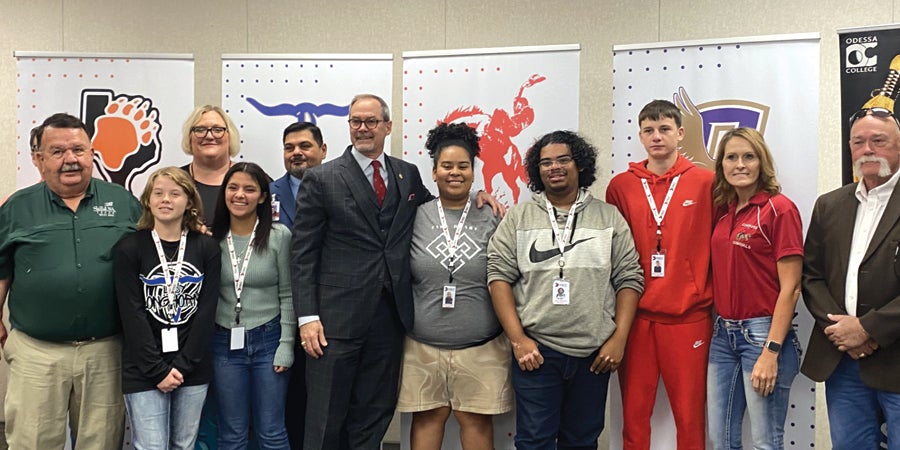Fulfilling the Future
Celeste Garcia knows her future is big in her small town. After four years in the Ignite Technical Institute at Falfurrias High School, she will graduate in June with an associate degree from Del Mar College in welding as well as two certifications in welding and an electrical apprenticeship certificate. Garcia was introduced to welding in eighth grade through a two-week special program offered by Brooks County ISD that included hands-on experience and a welding competition.
“This is something that is interesting,” she thought at the time. “I liked it. I liked that we were doing better than the boys in the competition.” She came in second and hasn’t looked back.
Falfurrias and other public schools are preparing future members of the Texas workforce in compelling and innovative ways, from offering them free college credits while attending high school to industry certifications to real-world experiences. Career and technical education programs across the state are striving to meet regional workforce needs through college and industry partnerships.
Garcia is a student in the Rural Schools Innovation Zone, a collaboration among five South Texas school districts that combines resources and students to provide comprehensive CTE programs with college credits and industry certifications that meet the workforce needs in the area. Because she had the flexibility to take required coursework early, Garcia has been able to focus on her craft in her senior year. She is in the welding building at Ignite Technical Institute from 7:30 a.m. to 4:30 p.m. every day.
“You come in, you get dressed, and we learn something new every day,” she said. “It is so exciting to come and see what we are going to do today.” Following this unconventional path has given Garcia the fortitude to face some difficult losses in her family. “If I didn’t have welding, I don’t think I would be anywhere,” she said when describing the loss of her father and grandmother and the support she received from her instructors.
Support From the Top
Michael Gonzalez, executive director of RSIZ, gives credit to the support of the superintendents and school boards who have joined together to create more opportunities for their students in a swath of South Texas about 90 minutes west of Corpus Christi. “Leadership takes a vested interest in helping students reach their goals and making their dreams come true,” he said.
The five members in the zone — Agua Dulce, Benavides, Brooks County, Freer, and Premont ISDs — offer students who join RSIZ the choice of five academies that focus on the fields of education, healthcare, JROTC, skilled technical trades, and STEM. The academies partner with different colleges in the area, including Coastal Bend College, Del Mar College, Texas A&M Kingsville, and Texas A&M Corpus Christi. Each academy offers industry credentials and dual credits for college and associate degrees.
Gonzalez also credits the Texas Education Agency’s initiatives for the robustness of the zone’s programs. “At the forefront is P-TECH. In my opinion, that is the future,” he said.
Pathways in Technology Early College High School, or P-TECH, is a statewide program that encourages students who are not traditionally on the path to college to receive college credit and workplace credentials while still in high school. These programs follow a P-TECH Blueprint from TEA to provide support for students with career training and real-life experience.
“We know that our kids need more support as they get a little older. We do a pretty good job in the brick and mortar situation of getting our kids to graduate and getting certifications,” Gonzalez said. “To really be a viable solution, the year-five and year-six support that P-TECH allows us is genuine. Once we start taking advantage of that, you are going to see a lot more production from independent school districts in better aligning ourselves to the workforce needs of each region.”
Community Workforce
Inspired by and modeled after RSIZ, the Permian Basin Innovation Zone seeks to increase student access to high-wage, high-demand jobs in West Texas. PBIZ is a collaboration between Buena Vista, Crane, Grandfalls-Royalty, and McCamey ISDs as well as Midland College, Odessa College, and industry leaders in the area.
“The goal was to grow the workforce within the communities and help lift these communities out of poverty,” said Sara Saleem, PBIZ director. The former Midland ISD teacher described how PBIZ leadership has been very intentional in building the curriculum and foundations of the program, with extensive market research focused on labor needs and trends in the area.
“Our goal is to get students into higher ed programs that connect to a pathway or directly into the workforce,” Saleem said.
After a year of planning and preparing, classes in the education, medical, and welding academies started this year with 67 ninth grade students across the four districts, which is about 40% of the total freshman population. “TEA is leaning toward the completer model, so we are creating our programs to follow that model,” Saleem said about the decision to not offer partial programming to upper classmen. Both zone programs are looking to include oil and gas, renewable energy, and automotive to the academies.
“The goal is to build internships into each pathway,” Saleem said. “We are talking to industry partners about building curriculum and the required certifications to prepare the employees they need in the future.”
Employability Skills
“The future is about skills,” said Rich Froeschle, senior labor market economist for Texas State Technical College in Waco. “Both technical skills that align with the trajectory of the economy and employability skills, which is more about the attitudes toward work and work ethic, behaviors and judgements, and critical thinking.”
According to Froeschle, workforce data points toward growth in specialty trade construction, including HVAC, plumbing, and electricians. “Technical healthcare fields will continue to grow as the population ages and demands more healthcare,” he said. “But if there is a single answer to future workforce needs, it starts with greater emphasis on employability skills, aka soft skills, and using technologies like generative AI to solve problems and improve productivity.”
Trustees across the state try to balance these different types of workforce needs. Tulia ISD Board Member William Fifer worries about the future of the students in his small district in the Panhandle. Like so many trustees wrestling with tight budgets and daunting policies, he hopes his district is doing enough to provide programs and resources to equip the students to be successful after graduation.
“My biggest concern is that when our kids graduate that they are college, career, and military ready. They are prepared to go out into society and be good citizens, whether they stay in Tulia or go somewhere else,” said Fifer.
Expanding Opportunities
“As trustees, we are constantly challenging ourselves to ask the questions,” said Lynn Boswell, Austin ISD trustee and a member of the TASB Board of Directors. “It’s not enough to just offer these programs. It’s important to offer programs that expand opportunity, that really do something meaningful for our students.”
As a larger district, Austin ISD offers a wide array of CTE and college preparatory programs, including P-TECH, advanced placement, international baccalaureate, On Ramps, and magnet schools.
“A thing I love about it as a trustee is our role of connecting the community with the district,” Boswell said. “We have partnerships with community colleges, partnerships with businesses, our students get to do internships, and professionals from industry are in classrooms.”
One of the Austin ISD programs with community connections is the Clifton Career Development School, a CTE-focused center that allows high school students across Austin ISD to participate in programs of study in areas such as welding, culinary arts, hospitality, and plant science. Currently, 270 students are enrolled from 14 different high schools in the district.
“About 98% of the students in our programs are also in special education programs,” said Sachi Edson, assistant principal at the Clifton Career Development School. While CTE programs across the state accommodate a wide range of students, Clifton is designed to work with special education case managers to provide support to students even beyond graduation with internships focused on acquiring additional life skills.
Clifton serves lunch to the public every Friday in a restaurant-style setting that is a collaboration of the students in the culinary, hospitality, and plant science programs. Michael McGhee, a senior from Akins High School in the Clifton hospitality program, was joined at Clifton by his mother, Ulla Stewart, on a Friday in December. She came to enjoy a lunch of marinated beef and mashed potatoes, proudly taking photos of McGhee as he seated guests and poured water and iced tea.
Culinary students brought out plates of food to the tables that were decorated with poinsettias grown from seeds by plant science students. The students described the food to patrons in detail, just like waiters in an upscale restaurant. Students planned and prepared every facet of the meal.
McGhee would like a career as a rap musician, but his mother beamed as he spoke confidently about his prospects. “I will definitely go work in a restaurant after graduation,” he said.
Boswell said Austin ISD strives to connect people with the real world. “The trick with that is making sure that we are training people for things they can really run with and earn a living wage,” she said.
Paths to Success
The increased focus on workforce training in public schools comes at a time when Americans’ confidence in higher education appears to be on the decline. As college costs continue to increase, Americans’ belief in the viability of a college education has decreased. Just 36% of those polled by Gallup in June stated they had “confidence in higher education,” which is down from 57% in 2015 and 48% in 2018.
As a traditional college education feels out of reach, school districts are providing other paths to success. “I think for years CTE got a bad reputation because the program offerings did not match the regional occupational demand,” said Froeschle. “TEA has taken on an enormous task to reform CTE and instituted new programs of study that give students multiple occupational exit points and must be aligned with local job demand. That’s a huge step in the right direction.”
More and more students are graduating from Texas public schools with substantial college credits, associate degrees, and industry training.
“I’m also impressed with colleges, like my own Texas State Technical College, that are putting greater emphasis on reaching out to high school CTE students and letting them know about the learning opportunities available to them,” said Froeschle. “High school and CTE coursework are an important stage in the personal talent development process. But most important, I think we need to do a better job of communicating to students that a four-year college education is not the only route to career success and upward wage mobility.”
Garcia, the senior at Falfurrias High School, did get the message about different educational and career opportunities. Like many seniors, she will walk the stage in June with an associate degree and multiple industry certifications to her credit. She plans to work and continue her education after graduation.
“I want to become a welding inspector and have my own welding company after getting my bachelor’s degree,” Garcia said.
Photo: Permian Basin Innovation Zone administration, faculty, students, and business industry partners pose with Texas State Sen. Kevin Sparks , R-Midland, at a press conference on Oct. 17, 2023. (Courtesy of Permian Basin Innovation Zone)
This article first appeared in the Jan/Feb 2024 issue of Texas Lone Star.
Beth Griesmer
Beth Griesmer is a senior communications specialist for TASB.





